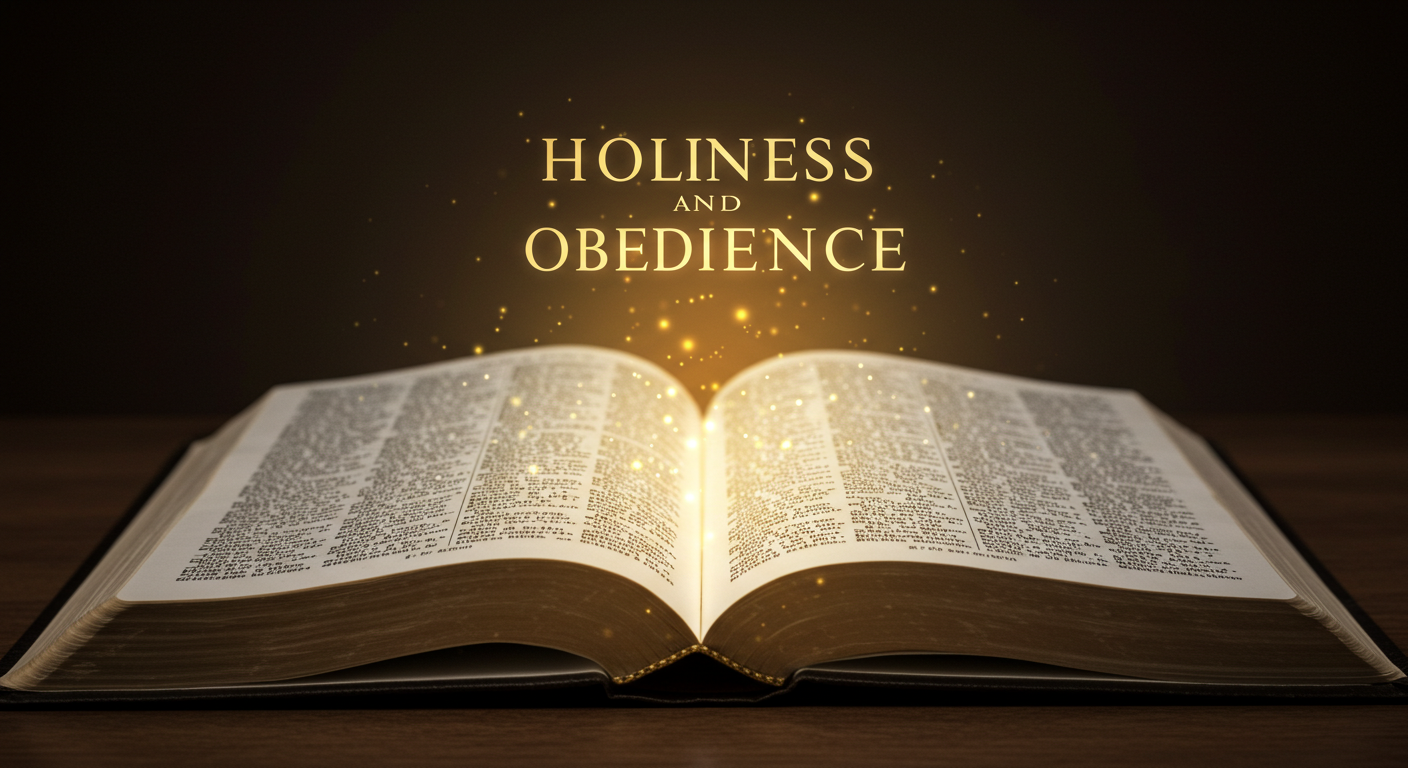What The Bible Teaches About Holiness And Obedience
You probably came here wanting clarity — maybe because you’ve heard phrases like “be holy” and “obey God” a hundred times, but you’re not sure what they actually mean for your daily life. The Bible teaching on holiness and obedience isn’t just abstract theology; it’s deeply practical, shaping how you think, speak, work, and love. In this article, you’ll walk through key scriptures, clear explanations, examples from Scripture, and practical steps so you can take the Bible teaching on holiness from theory into practice.
What is Holiness?
Holiness in the Bible is about being set apart for God and reflecting God’s character. It’s not mainly about impressive religious behavior; it’s about the transformation of heart and life so that you increasingly resemble the One who is perfectly holy. The Old Testament repeatedly calls God’s people to be distinct: “Be holy because I am holy” is a foundational command you’ll see echoed through Scripture. See how Leviticus frames this relationally and morally: Leviticus 11:44.
When you study the Bible teaching on holiness, notice that holiness is both positional and progressive. Positional holiness is what God has declared for you in Christ — you are set apart because of His work. Progressive holiness (sanctification) is the daily growth toward that status in your character and habits. Those two realities work together: God positions you in holiness and calls you to pursue it with His help.
The Heart of Holiness: God’s Character
Holiness starts with God Himself. The Bible opens up with a vision of God’s distinctiveness — He is utterly other, pure, and morally perfect. Prophetic visions capture this truth in dramatic terms, reminding you that holiness flows from the nature of God. For a vivid picture, read the heavenly scene where angels proclaim God’s utter holiness: Isaiah 6:3.
When you keep the Bible teaching on holiness in view, you’ll realize that holiness is not merely a list of dos and don’ts. It’s the moral reflection of God’s own character in your heart. As you draw near to God, His holiness reshapes your desires and decisions. The call to holiness is an invitation to share in the life and character of God — not to become divine, but to be transformed by Him.
Holiness in the Old Testament: A Community Set Apart
In the Old Testament, holiness had a corporate dimension. Israel was called to be a holy nation, distinct from the surrounding peoples in worship and ethics. You’ll see laws that regulated worship, diet, and daily conduct, designed less to burden you and more to shape your identity as God’s people. The call to be different was meant to make you a visible sign of God’s presence in the world. Consider how Deuteronomy roots love for God in a wholehearted life: Deuteronomy 6:5.
The Bible teaching on holiness in the Old Testament also recognizes human weakness. Rituals and sacrifices pointed to a deeper need: a cleansed heart. That’s where prophetic literature steps in, calling for justice, mercy, and humility rather than mere ritual compliance. Micah summarizes God’s desire for you in terms of ethical living: Micah 6:8.
Holiness in the New Testament: The Heart Renewed
When you move into the New Testament, holiness becomes primarily a matter of the heart because Jesus brings inward transformation. The New Testament writers emphasize that God’s Spirit dwells in you, empowering a life that increasingly reflects Christ. Peter explicitly tells you to live a life set apart: 1 Peter 1:15-16.
The apostle Paul shows how holiness grows through union with Christ. Baptism, confession, renewing your mind, and walking in the Spirit are all part of the process. You’re reminded that sanctification is not a one-time event but a lifelong journey: Romans 6:1-4 and Romans 12:1-2.
Obedience: What the Bible Means by It
Obedience in Scripture is often simpler than you think: it’s loving, trusting, and following God with your whole heart. Obedience isn’t mere rule-following; it’s the natural outflow of a relationship with God. Jesus made this clear when He said, “If you love me, keep my commands.” See His words: John 14:15.
Obedience is relational rather than transactional. You obey because you know and trust the One who commands. In John 14, you also find a promise that the Father will send the Spirit to those who love and obey, underscoring the role of divine help in obedience: John 14:23-24.
Why Holiness and Obedience Belong Together
You shouldn’t think of holiness and obedience as two unrelated commands. Holiness is the aim — to be like God — and obedience is the pathway. God’s standards help shape you into people who live differently. The two are intertwined in the Scriptures because holiness without obedience becomes wishful thinking, and obedience without heart change becomes legalism.
James is blunt about the connection between hearing and doing — obedience completes faith. He pushes you to be a doer of the word, not merely a listener: James 1:22. The practical fruit of obedience — evidenced in love and service — is how holiness shows up in the world.

Key Scriptures on Holiness and Obedience, Explained
Here you’ll find some of the core Bible passages that shape the Bible teaching on holiness and obedience, with short explanations to help you apply them.
- Leviticus 11:44: God’s command to be holy because He is holy sets the foundation for moral distinctiveness.
- 1 Peter 1:15-16: Calls you to live a life of sanctity in light of God’s call and power.
- Hebrews 12:14: Urges you to pursue peace and holiness, noting that without holiness you will not see the Lord.
- Romans 6:1-4: Explains how baptism symbolizes death to sin and new life in Christ, a practical basis for holy living.
- John 14:15: Connects love for Jesus with obedience to His commands.
- James 2:14-26: Demonstrates that genuine faith expresses itself in obedience and works.
- Philippians 2:8: Shows Jesus’ perfect example of obedience, even to death, which becomes the model for your own obedience.
Each of these passages points you in a slightly different direction, but together they form a consistent message: holiness is God’s purpose for you, and obedience is how you participate in that purpose.
Obedience Is Not Blind; It’s Rooted in God’s Revelation
You might wonder: Is obedience just following human commands? The Bible teaching on holiness insists that true obedience is rooted in God’s revelation — His Word and His character. When believers in Acts faced pressure to conform to human authority, they chose God’s commands instead: Acts 5:29.
Obedience guided by Scripture is a reasoned and relational response. You obey not because someone told you to, but because God has revealed His way and you trust it. That trust is cultivated by Scripture, prayer, and the witness of the Spirit.
Examples of Obedience in Scripture
Stories help you see obedience in action. Abraham’s willingness to offer Isaac is perhaps the most striking example: he obeyed when God asked him to do the unthinkable, trusting that God’s promise would not fail: Genesis 22:1-18. Abraham’s obedience is not applauded as unquestioning fanaticism but as faith that trusted God’s character.
Moses shows another facet of obedience — the call to lead despite personal inadequacies. When God called Moses from the burning bush, Moses ultimately listened and followed: Exodus 3:4. And Jesus provides the perfect model: His obedience unto death reveals the depth of Christlike submission and love: Philippians 2:8.
You’ll also see negative examples, like Saul’s partial obedience, which in essence shows you that outward acts without surrender lead to failure: 1 Samuel 15:22.
Obedience vs. Legalism: Where’s the Line?
It’s easy to drift into legalism, treating obedience as mere rule-keeping without heart transformation. The Bible teaching on holiness guards against that by emphasizing motivation. Paul repeatedly warns that you’re not saved by law-keeping but by grace; yet that grace is meant to produce holiness, not license to sin. Read how Paul reframes obedience as a response to grace and not a means to earn God’s favor: Romans 6:1-4 and Romans 12:1-2.
You obey because you’ve been transformed, not to become transformed. If your obedience is driven by fear or pride, it’s worth checking your heart. The goal is living by the Spirit, which produces genuine obedience that comes from love and trust: Galatians 5:16-25.
Grace and Holiness: How They Work Together
Don’t let the tension between grace and holiness confuse you. The Bible teaching on holiness makes it clear that grace initiates salvation and empowers sanctification. The same grace that saves you also teaches you to say “no” to ungodliness and “yes” to godly living. Titus puts it plainly: Grace trains you to live a holy life: Titus 2:11-14.
Sanctification is not a solitary project you must complete by sheer effort. God’s Spirit is actively transforming you. Hebrews urges you to run with perseverance the race marked out for you, fixing your eyes on Jesus, the author and perfecter of faith: Hebrews 12:1-2. The Bible teaching on holiness insists that you cooperate with God: you exercise faith and obedience, and the Spirit produces the moral fruit.
Practical Ways You Grow in Holiness and Obedience
You might be asking, “Okay, what does this look like in my life?” Here are practical habits rooted in Scripture that help you grow in holiness and obedience. These are not magic formulas; they’re faithful practices that the Bible consistently recommends.
- Read and meditate on Scripture daily to know God’s will and renew your mind: Psalm 119:11 and Romans 12:1-2.
- Pray honestly and persistently, asking the Spirit to shape your desires and empower obedience.
- Participate in a community where you’re encouraged and corrected in love: Colossians 3:12-17.
- Serve others sacrificially as an expression of Christlike obedience: Philippians 2:3-4.
- Practice confession and repentance regularly; Psalm 51 models this heart posture: Psalm 51:10.
These practices will help transform your inner life and outward actions. As you build these habits, the Bible teaching on holiness becomes less theoretical and more lived reality.
Obstacles to Holiness and How to Overcome Them
You’ll face obstacles: busyness, cultural pressures, temptation, and even confusion about what obedience looks like. The Bible gives you resources for each obstacle. For example, when temptation comes, Galatians invites you to live by the Spirit rather than satisfying the flesh: Galatians 5:16-25. When your mind is polluted by false patterns, Romans and Ephesians call you to be transformed by renewing your mind and putting on the new self: Romans 12:1-2 and Ephesians 4:22-24.
You’ll also need to recognize that obedience sometimes brings conflict. Jesus warned that following Him may cost you relationships, comfort, and status. Still, the Bible teaching on holiness reminds you that when you choose obedience, you’re choosing life and deep joy in the long run.
The Role of Suffering in Your Sanctification
Suffering isn’t pointless; it’s often an instrument of sanctification. Hebrews and James both show how trials refine faith and produce endurance. When you suffer for doing what’s right, Scripture encourages you to see it as growth in holiness rather than pointless pain: Hebrews 12:14 and James 1:2-4.
You can trust that God is at work even in discomfort, shaping Christlike character. Difficult seasons often drive you back to the essentials — prayer, Scripture, dependence on the Spirit — and those essentials are the heart of the Bible’s teaching on holiness.
How Obedience Shows Genuine Faith
The New Testament consistently teaches that genuine faith results in obedience. James is clear: faith without works is dead. When you believe, your life will show it in obedient love and service: James 2:14-26. John also gives a test of true faith: keeping God’s commands and walking as Jesus walked: 1 John 2:3-6.
Obedience isn’t a way to earn your standing with God; it’s the evidence that God’s work in you is real. When you find your life increasingly aligned with God’s Word, that’s proof of transformation.
Holiness, Obedience, and the Church’s Witness
Holiness and obedience aren’t just personal goals; they shape how the church witnesses to the world. A community marked by love, integrity, and obedience to Christ becomes a compelling testimony. Paul urges believers to put on virtues that make the church a beautiful reflection of Christ: Colossians 3:12-17.
When you and your fellow believers live out the Bible’s teaching on holiness, you reveal God’s goodness. Your ethical choices — fairness at work, kindness in conflict, generosity to the needy — testify to a different source of life and hope.
Frequently Asked Questions about Holiness and Obedience
You might have specific questions. Here are short answers rooted in Scripture.
- Does grace mean I can sin? No. Paul answers this directly: grace frees you from sin’s power so you don’t continue in it. See Romans 6:1-4.
- Is obedience only outward actions? No — Scripture emphasizes heart transformation as the source of true obedience. See 1 Peter 1:15-16.
- How do I know what God’s commands are? Bible reading, prayer, and community are your guides, as well as clear moral teachings in Scripture like the Sermon on the Mount: Matthew 5:48.
If you press into these answers with prayer and Scripture, the picture will become clearer in your life.
Personal Practical Plan for Growing in Holiness
If you want a straightforward plan to begin, try this simple rhythm for 90 days:
- Morning: Read a short passage (10–15 minutes), ask the Spirit to show one application, and memorize a verse that shapes your desire: Psalm 119:11.
- Midday: Pause for prayer and a moment of confession and recommitment.
- Evening: Reflect on the day — where did you obey? Where did you fail? Ask God for grace and practical help for tomorrow.
- Weekly: Gather with a small group for mutual encouragement and accountability: Colossians 3:12-17.
This isn’t legalism; it’s a discipline of dependence on God’s Spirit working through the ordinary patterns of your life.
Final Encouragement: Look to Jesus
If you’re tempted to rely on your effort alone, fix your eyes on Christ. Jesus is the author and perfecter of your faith; His life shows the kind of holiness and obedience God desires. Philippians frames Jesus’ obedience as the ultimate example you’re called to follow: Philippians 2:5-8.
The Bible teaching on holiness reminds you that sanctification is both a gift and a task. God has given you His Spirit; He calls you to cooperate. Don’t grow discouraged by setbacks. God’s work in you is sure, slow, and good.
Summary: What You’re Being Told to Do
To recap the Bible teaching on holiness: you’re called to be distinct because God is distinct; obedience is the natural result of knowing and loving God; grace empowers your growth; and practical, daily habits shape your transformation. Scripture’s commands are not arbitrary; they’re designed to make you more like Christ and to bless the world through you.
You’re invited to respond with faith: trust God’s promises, obey His Word, and rely on the Spirit. As you do, holiness becomes less of an abstract ideal and more of the ordinary reality of your life.
Explore More
For further reading and encouragement, check out these posts:
👉 7 Bible Verses About Faith in Hard Times
👉 Job’s Faith: What We Can Learn From His Trials
👉 How To Trust God When Everything Falls Apart
👉 Why God Allows Suffering – A Biblical Perspective
👉 Faith Over Fear: How To Stand Strong In Uncertain Seasons
👉 How To Encourage Someone Struggling With Their Faith
👉 5 Prayers for Strength When You’re Feeling Weak

📘 Jesus and the Woman Caught in Adultery – Grace and Mercy Over Judgement
A powerful retelling of John 8:1-11. This book brings to life the depth of forgiveness, mercy, and God’s unwavering love.
👉 Check it now on Amazon
🌍 “Every great message deserves a home online.”
Don’t let your calling stay hidden. Start a Christian Blog/Website using Hostinger — with 99.9% uptime, free domain, and SSL, your voice can shine for God’s glory anytime, anywhere.
👉 Begin today. Try it RISK-FREE!
“Your body is God’s temple — care for it with purpose.”
Renew your energy and restore balance the natural way. Mitolyn helps support a healthy metabolism, giving you the vitality to live out God’s calling with strength and confidence.
🌿 Unlock Your Metabolic Power. Burn More Calories & Feel Great With Mitolyn.
👉 Start Today. Check Price Now.
As a ClickBank & Amazon Affiliate, I earn from qualifying purchases.
Acknowledgment: All Bible verses referenced in this article were accessed via Bible Gateway (or Bible Hub).
“Want to explore more? Check out our latest post on Why Jesus? and discover the life-changing truth of the Gospel!”







